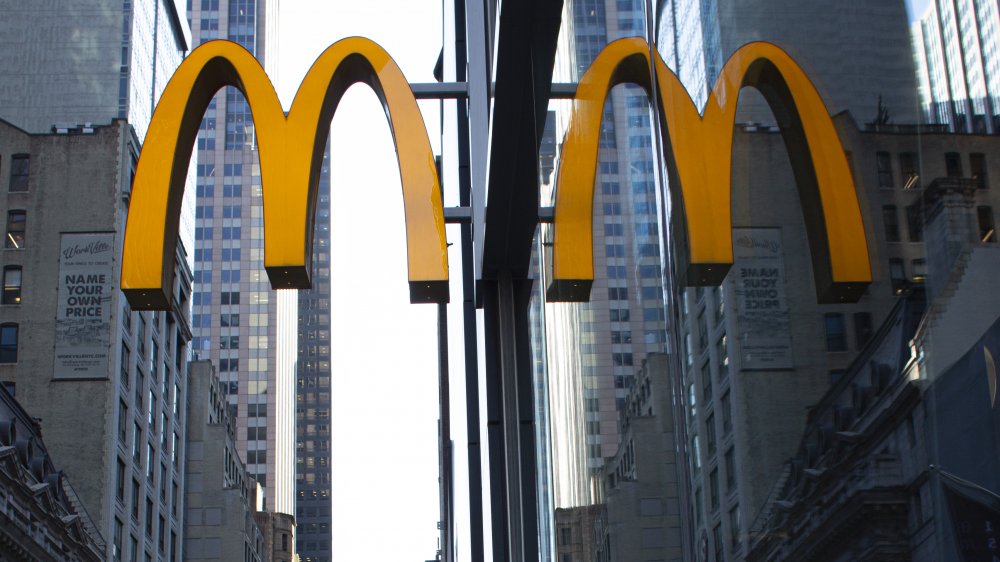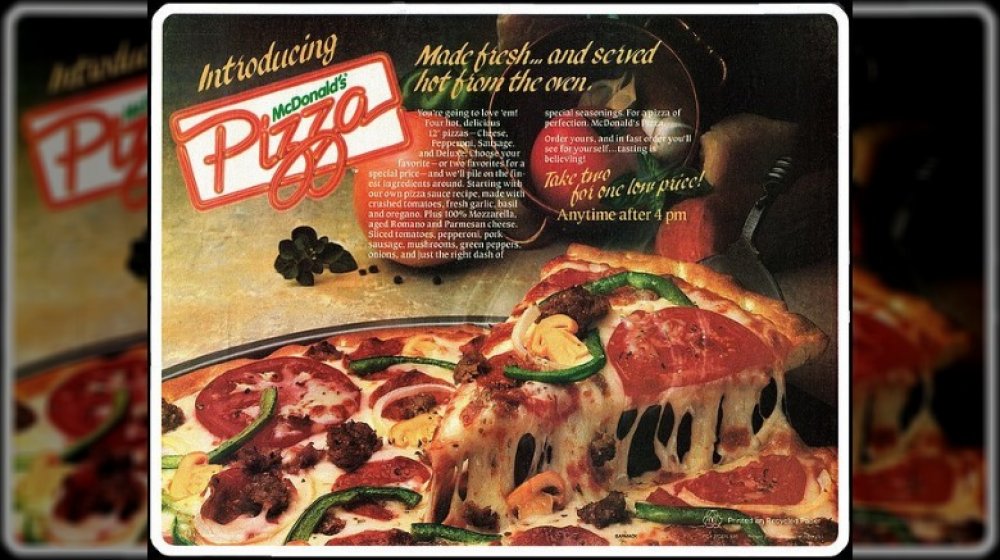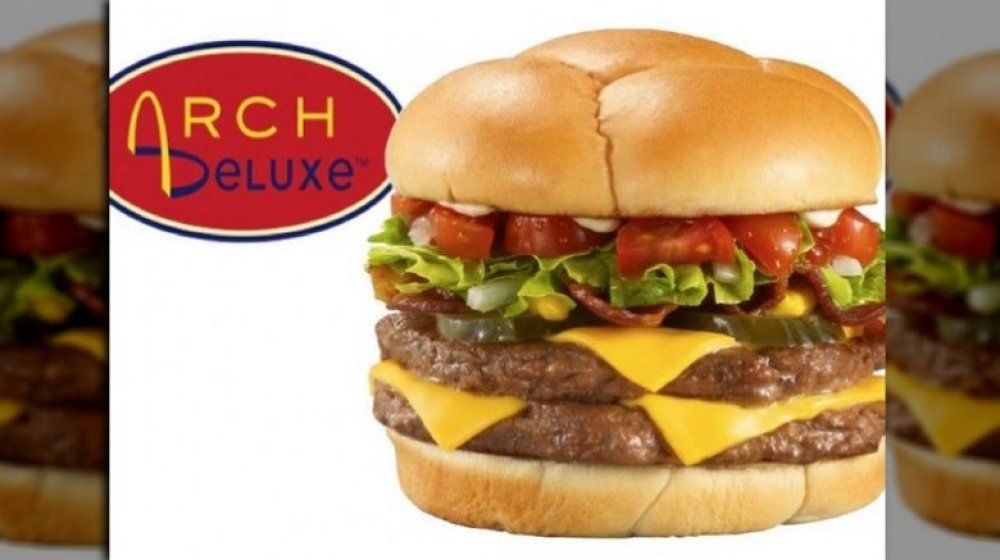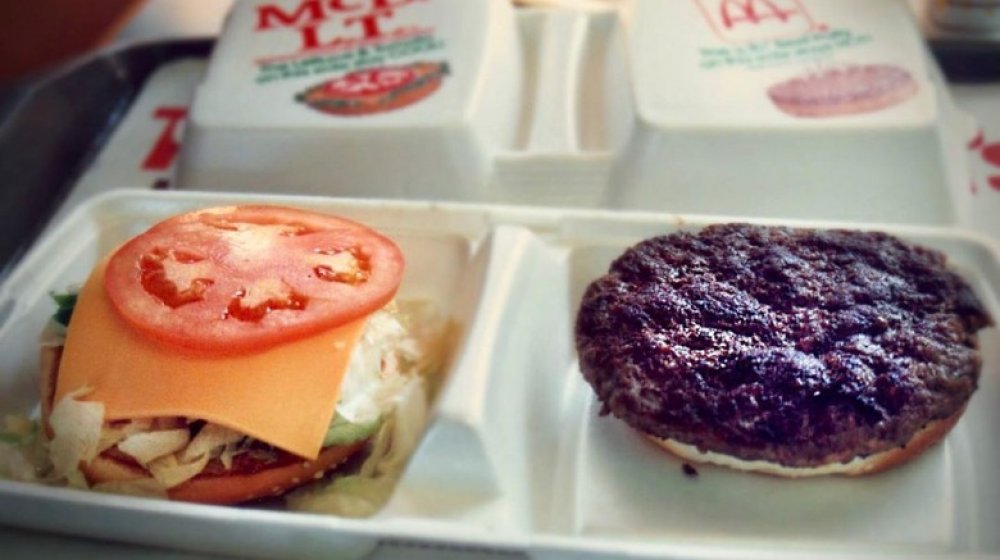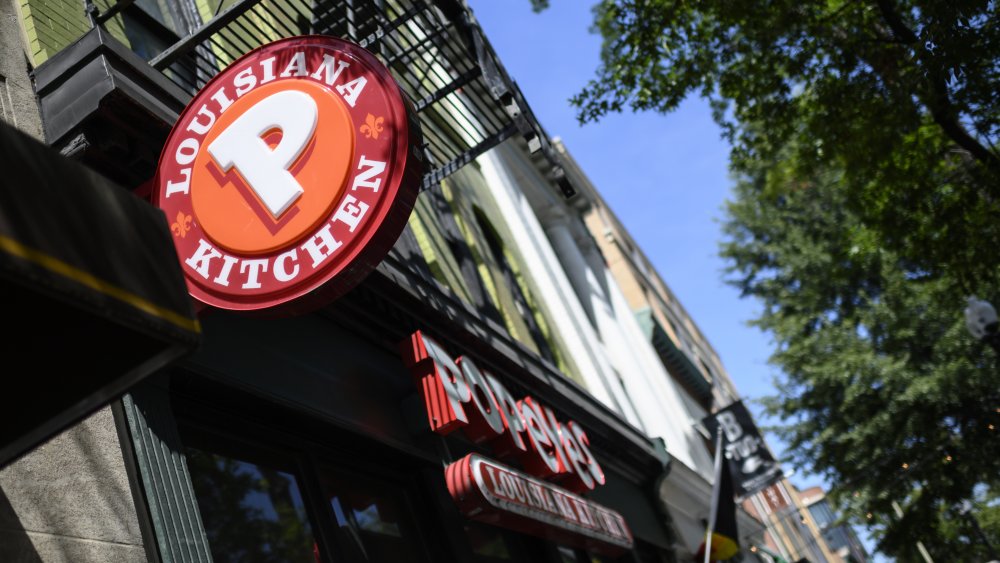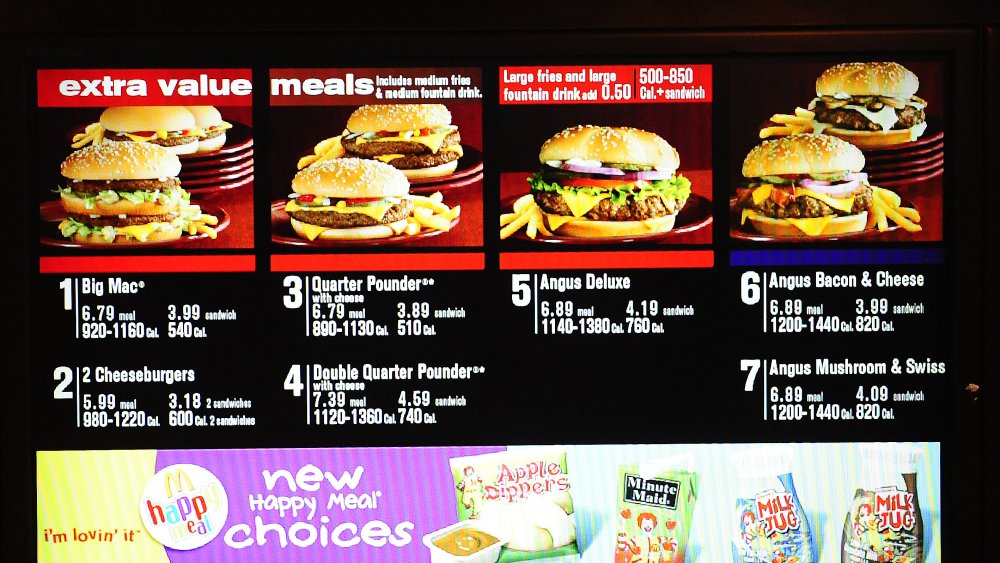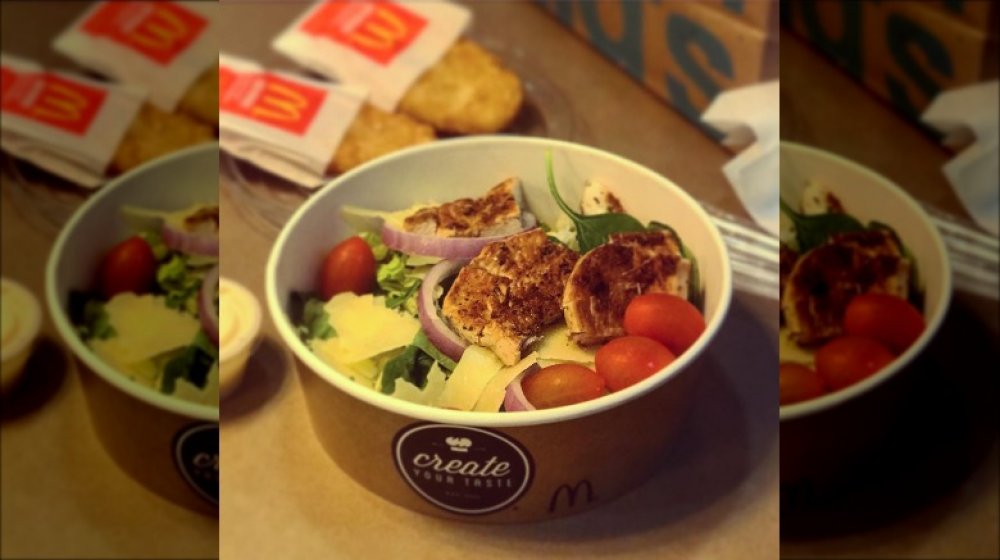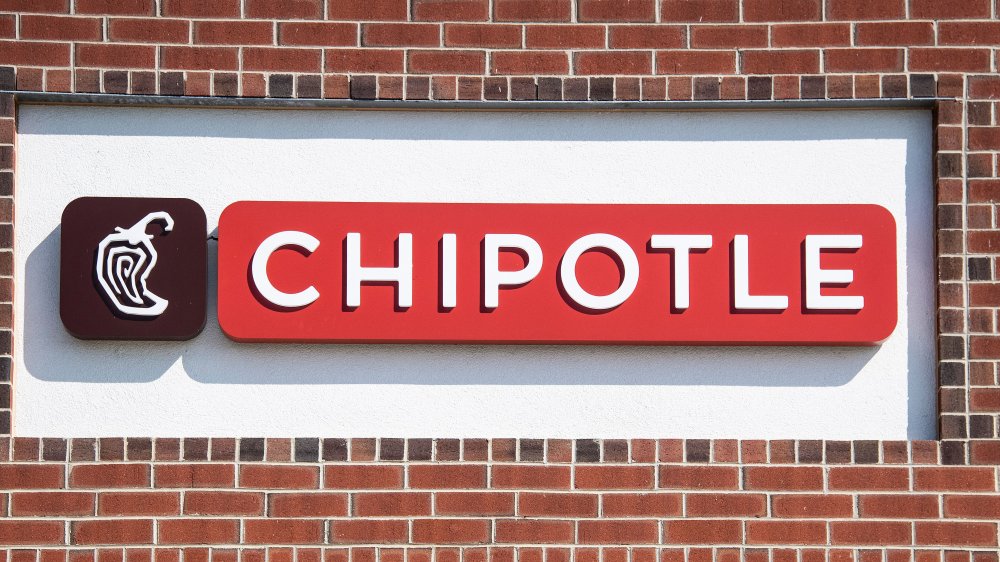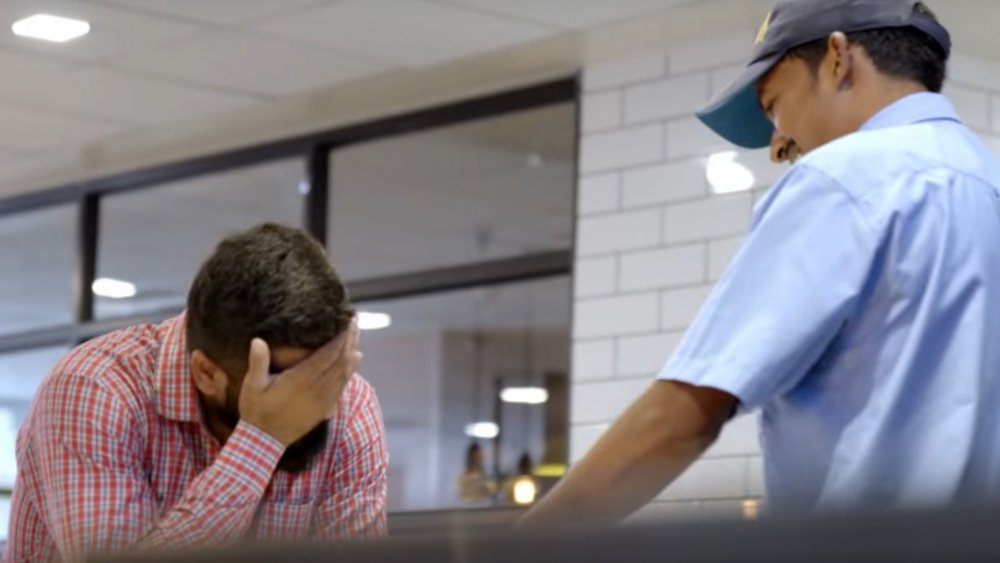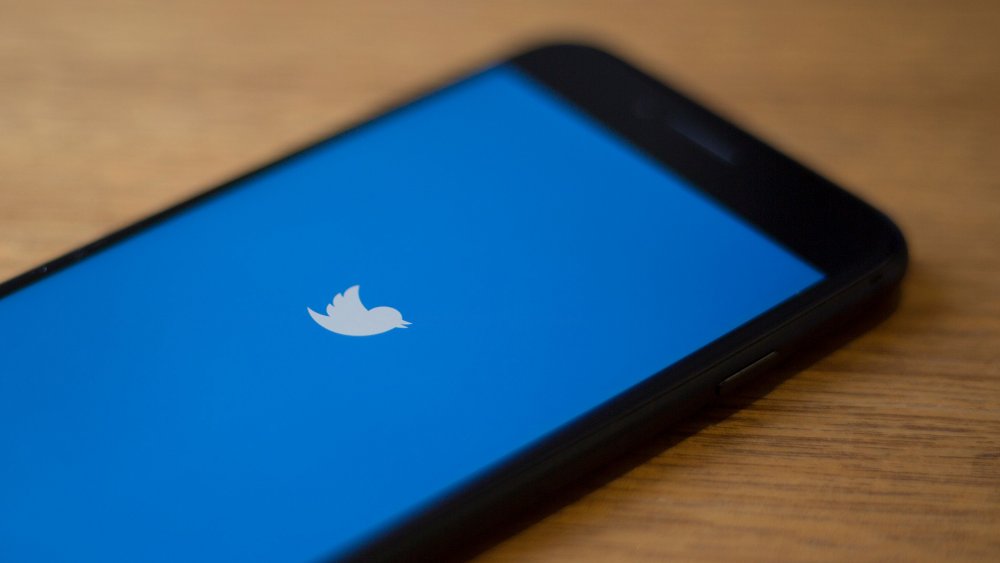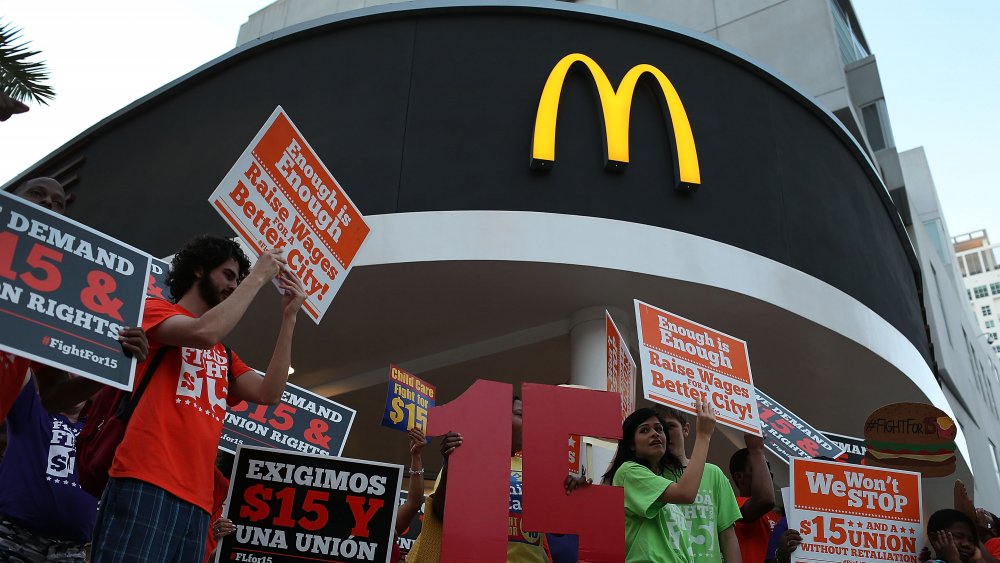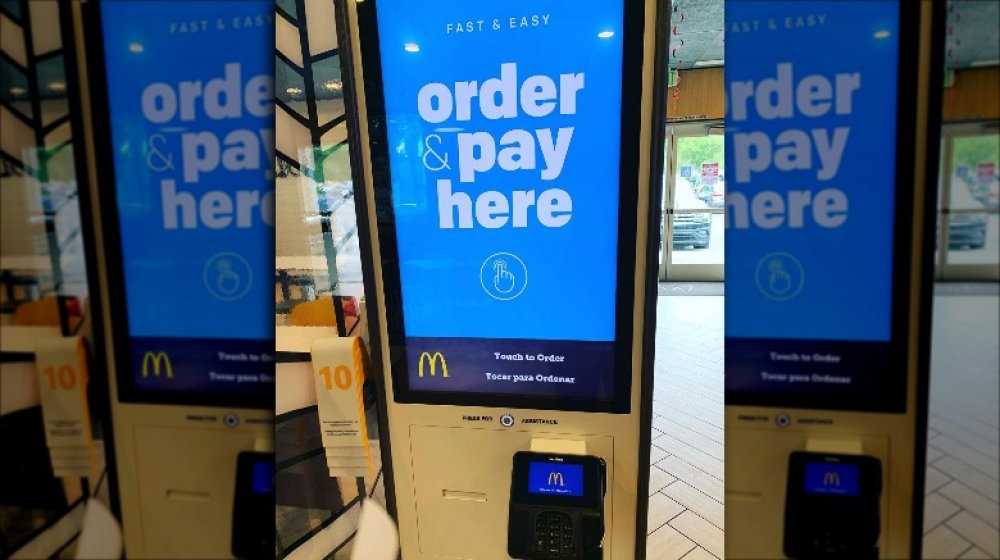McDonald's Has Made Some Pretty Bad Decisions
McDonald's has been serving up burgers for well over 60 years now, and a certain number of things come with that kind of age. Success is one of them, of course, and we don't need to tell you just how successful McDonald's have become — after all, there's a good chance you're sitting in one right now. Another is experience, and McDonald's has got plenty of that, too; far beyond what most of its rivals can claim.
But in order to become experienced at something, sometimes you've gotta fail a little first — and God knows McDonald's has seen its fair share of failures. Unfortunately, we can't even say it wasn't their fault, either, because some of the company's most monumental gaffes have come about entirely thanks to bad decision-making.
Yeah, there's no easy way to say it: for these particular mess-ups, McDonald's only has itself to blame. From chicken wars, to bloated menus, to artificial intelligence, here are some of McDonald's worst decisions.
McDonald's tried to become a pizza chain
These days, McDonald's has so successfully cemented their reputation as the world's leading burger chain (or one of them, at least) that it's easy to forget some of the unfortunate attempts the chain has made to break out from the hamburger niche.
According to MentalFloss, McDonald's in the '80s was double the size of its next biggest competitor and owned nearly 40 percent of America's burger market. But the world remained unconquered, and McDonald's execs had their eyes set firmly on a different food category.
In 1986, rumors began to appear that McDonald's were going to introduce a pizza option to the menu in order to bring in customers in the evening hours. In pursuit of this goal, the company spent many years developing an oven that could quick-cook pizzas in just six minutes. By 1989, around 24 restaurants in America were testing the McDonald's pizza. But things went very wrong, very quickly.
Busy restaurants took too long to make the pizzas, which also ended up costing far more than customers expected. But for some reason, the company decided to expand their pizzas further, to nearly 40 percent of their stores by the early '90s. Before long, however, they were gone — and years of research, patents and preparation went to waste because nobody realized that it takes longer to make a pizza than it does a burger.
McDonald's spent hundreds of millions marketing a "grown-up" burger
In 1996, McDonald's introduced the Arch Deluxe to their stores. This new menu item was aimed at adult customers, and was intended to be a more sophisticated burger than people were used to seeing in stores. But creating the Arch Deluxe wasn't the big mistake here (well, not the biggest, at least). No, that honor goes to the marketing campaign.
McDonald's spent an estimated $150-200 million advertising the introduction of the Arch Deluxe. If you need that put in perspective, that means there's a good chance that trying to sell this burger cost more money than it took to produce James Cameron's Avatar. And sure, one of those things ended up making over a billion dollars, but trust us — it wasn't the grown-up burger.
In the end, the Arch Deluxe sold far short of what executives hoped it would, partly thanks to the fact that it cost well north of $2, which was a hefty price to pay for a fast food burger at the time. By the late '90s, the Arch Deluxe had been discontinued, a bunch of McDonald's suits had been bitterly disappointed and, presumably, someone learned the valuable lesson that throwing money at a problem isn't going to fix it.
McDonald's doubled down on plastic
These days, environmentalism is such a hot topic that even the world's biggest mega-corporations are willing to make at least token gestures towards staying in the planet's good graces. Back in the day, however, things were very different, and nothing illustrates that better than McDonald's decision to introduce the double clam shell container to its stores.
This container, which used exactly 100 percent more polystyrene packaging than a normal McDonald's clam shell, was designed for the McD.L.T., a burger that, for some inexplicable reason, had its hot and cold ingredients separated before serving. One clam shell contained, the bottom bun and meat, while the other contained lettuce, tomato, cheese, pickles, sauces and the top of the bun. Unfortunately, by the 1980s — when the McD.L.T. hit menus — people had started to become more aware of environmental issues, and the double clam shell was immediately embroiled in controversy. And before you could say "this weird gimmick is going to get a lot of seabirds killed", the McD.L.T. was removed from menus and the double clam shell was no more.
The fallout from the double clam shell scandal (clamgate?) clearly remained, however, because in 1990 McDonald's did that rarest of things: it made a really, really good decision. After coming under intense scrutiny for serving its burgers in polystyrene, the company finally announced that it would be discontinuing foam packaging and serving all its food in paper (albeit plastic-coated paper) from that point on.
McDonald's is staying out of the Chicken Wars
Yeah, the Chicken Wars. They're a thing alright, but they're probably not the thing you're imagining right now.
The 'Chicken Wars' is the name given to the flurry of business activity that has whirled up around an ongoing trend towards chicken in the fast food industry. Brands such as Chick-fil-A and Popeyes are bringing the chicken sandwich onto the burger's level, and the headlines they're making appear to demonstrate that chicken, not beef, is the future of fast food.
The big deal here is that McDonald's are sitting this one out. Despite seeing some success with their buttermilk chicken sandwich, the chain isn't really pushing forward with a range of chicken-based menu items, possibly since the "healthier" artisan grilled chicken sandwich has seen low sales. But they're missing out on a huge opportunity here.
Stephens analyst Will Slabaugh, for example, believes "there is room for the largest quick-service player to take advantage of the hole at the high end of its barbell on the chicken sandwich side and create a true competitor to the leaders."
McDonald's is leaving a whole field unplayed, and that's never a good decision.
McDonald's keeps growing the menu
We don't have to tell you that McDonald's likes things big. Really, really big. Hey, that documentary wasn't called Downsize Me, was it? But the company's obsession with making things bigger and better — and expanding all the while — has actually caused a few problems in recent years.
Nowadays, the McDonald's menu is massive. In 1948, the company only served nine different dishes, but today it features over 100 different items, including wraps, lattes, oatmeal, salads, breakfasts, smoothies, and much, much more.
Unfortunately, the knock-on effect of giving consumers so much choice (and trying to pilfer business from the company's rivals) has been that the wait for food and drinks at the restaurants themselves has become much longer.
McCafe drinks, for example, have to be made at a separate station behind the counter that is equipped with all the grinders and blenders needed to make coffee. The McWrap is another serial offender: this item is supposed to be assembled in 60 seconds or less, but reports suggest it takes workers over 85 seconds to do so, which skirts far too close to McDonald's goal of serving drive-through customers in 90 seconds or less.
The pizza travesty of the late-80s showed well enough that customers come to McDonald's for speedy service — and if you slow that service down, you lose those customers as a result. After all, are you really going to stop at a McDonald's drive-through if you've gotta wait in a long line first?
McDonald's keeps trying to go healthy
One of the main reasons behind the huge increase in the size of McDonald's menus lies behind one of the biggest mistakes the company has made in recent years.
In May 2015, new McDonald's CEO Steve Easterbrook admitted the company had recently made a few fatal, self-inflicted errors. Arguably the most important of these were the company's failure to recognize the need to serve high-quality food (hello, Chipotle!), and totally misinterpreting changing customer tastes.
Essentially, the sequence of events went like this: first, prices for McDonald's products increased, potentially as a way of providing greater customer value on certain menu items. By doing this, McDonald's was attempting to profit from the consumer belief that higher-quality food offered better overall value-for-money. But they got it all wrong — instead of actually offering fewer items with more care and better ingredients, they just expanded their menu and went "healthy" with more items like McDonald's salads.
Unfortunately, 2016 research suggested that although people prefer the idea of healthy food, they tend to avoid them in places like McDonald's. Nonetheless, the company kept on pursuing healthy food items, bloating that menu ever-further. And although this error didn't exactly sink the company, it does show that their insistence on offering healthy food in recent years hasn't so much come from a sense of business savvy as it has from a total inability to read the room.
McDonald's sold Chipotle
You've got regrets, right? Of course you do — you're human, after all. But whatever missed opportunities or silly mistakes haunt you from your past, at least take solace in this: none of them cost you tens of billions of dollars.
Can't say the same for McDonald's, though. You see, McDonald's once owned a 90 percent stake in the equity of a little company called Chipotle. In fact, it was McDonald's that helped out with capital, operation costs, and distribution for the burrito chain, and thanks to its patronage Chipotle thrived. For some reason, however, McDonald's decided to sell its ownership of Chipotle for $1.5 billion in 2006. Today, Chipotle's market cap stands at around $21 billion.
Unfortunately for McDonald's, the losses don't end there. That's because Chipotle has managed to gut McDonald's younger consumer base in recent years by offering healthier-style food made with high-quality ingredients, with a 2014 study suggesting American consumers in their 20s and 30s were flocking towards Chipotle and Five Guys because they believed those chains made better-quality food. And while McDonald's haven't exactly been destroyed by Chipotle — they're enjoying a $153 billion market cap today — you can't help but imagine they're feeling at least a little sore about having sunk so much time and money into supporting a smaller company... before losing it all by selling out and turning that company against themselves.
McDonald's tried preaching politics
Generally, McDonald's has made a point of staying out of politics — and from a strictly business perspective, that's probably the sensible thing to do. After all, why irritate anybody when you'll do just as well irritating nobody?
But that all changed in early 2019, when McDonald's decided to irritate everybody for a change. At the time, India was going through an election. In an incredibly misguided attempt to make a political point, McDonald's decided to set up a marketing stunt at one of their branches in Hyderabad. In this branch, as customers came in and made their order, the employees would respond by ignoring their order and giving them something completely different. When questioned about this, the employees would reply that, if you don't vote, you lose your right to choose.
Now, let's put aside the fact that those particular customers must have been seriously annoyed by that little stunt and focus on the point that Inc. raises in their article: how would you feel, as an Indian voter, if you watched a video in which a U.S. corporation nagged you about the importance of voting? When the U.S. falls far behind most other developed nations in terms of voter turnout, no less? You wouldn't be thrilled, that's for sure.
#McDStories was a McDonald's disaster
Back in 2012, McDonald's decided to jump on the Twitter bandwagon by introducing their own hashtag: #McDStories. The idea was simple: people could use the hashtag to share their heartwarming and lovely stories about the wonderful experiences they'd had at McDonald's. Simple enough, right?
Well, it's 2019 now, so at this point there's zero chance you don't know how social media works. Inevitably, Twitter users flocked to the hashtag to tell horrific stories, criticize the corporation, and generally mock McDonald's for ever thinking this could have been a good idea.
"Dude," one user wrote, "I used to work at at McDonald's. The #McDStories I could tell would raise your hair."
Another tweeted: "One time I walked into McDonalds and I could smell Type 2 diabetes floating in the air and I threw up."
"These #McDStories never get old," said one, "kinda like a box of McDonald's 10 piece Chicken McNuggets left in the sun for a week."
The campaign was pulled within two hours, but gleeful Twitter users continued to tell their horror stories. Worse still, McDonald's had actually paid to promote this hashtag, meaning a chunk of their marketing budget had essentially been spent on advertising against themselves. Oops.
McDonald's fought Fight for 15
The Fight for 15 is a movement dedicated to getting exactly they're named after: a $15 per hour minimum wage for workers in the fast food industry. Despite gathering steam over the last few years, in 2018 McDonald's found themselves very much on the wrong side of history when they were accused of using "intimidation tactics straight out of the Jim Crow era."
According to some of the workers behind the Fight for 15, McDonald's had "fought tooth and nail" to keep worker wages low, spending tens of millions of dollars every year to lobby politicians into fighting wage increases.
In one example, Memphis police officers had threatened to arrest striking workers, telling them that they had "authorization from the president of McDonald's to make arrests." Meanwhile, one franchise owner even joined a group of police officers who followed workers after a protest had ended.
In 2019, however, McDonald's backed down and agreed to halt lobbying against minimum wage hikes. McDonald's vice president of government relations said: "The conversation about wages is an important one; it's one we wish to advance, not impede."
McDonald's is leading the tech revolution — and that might be a bad thing
Here's something you would have noticed if you've stepped inside a McDonald's at any point over the last few years: the robots are taking over. Automated kiosks were introduced to McDonald's stores a few years ago, with the main incentive for their use being faster service, more accurate orders and (depending on who you believe) the opportunity to place more workers in the kitchen, increasing productivity.
And McDonald's are even going a step further than that: in 2019, the company began to implement AI technology at some drive-thrus, hoping technology would make the drive-through ordering process that much more efficient.
But although McDonald's has thrown itself full-force into backing the automation revolution (they spent around a billion dollars on kiosks in 2019 alone), this efficiency will doubtlessly come with a human cost. After all, replacing workers with machines often means both cutting workers' hours and laying people off.
In some restaurants, however, automation has led to an increase in staff members — often retaining human servers for customers who prefer that interaction, or even to fulfill the company's new commitment to table service, a feature brought in at the same time as kiosks.
The fact is, however, that McDonald's wants speed, efficiency and cost-effectiveness above all else, and there's a real risk that pursuing those goals will require the company to make some unfortunate — and arguably unnecessary — decisions in the future.
